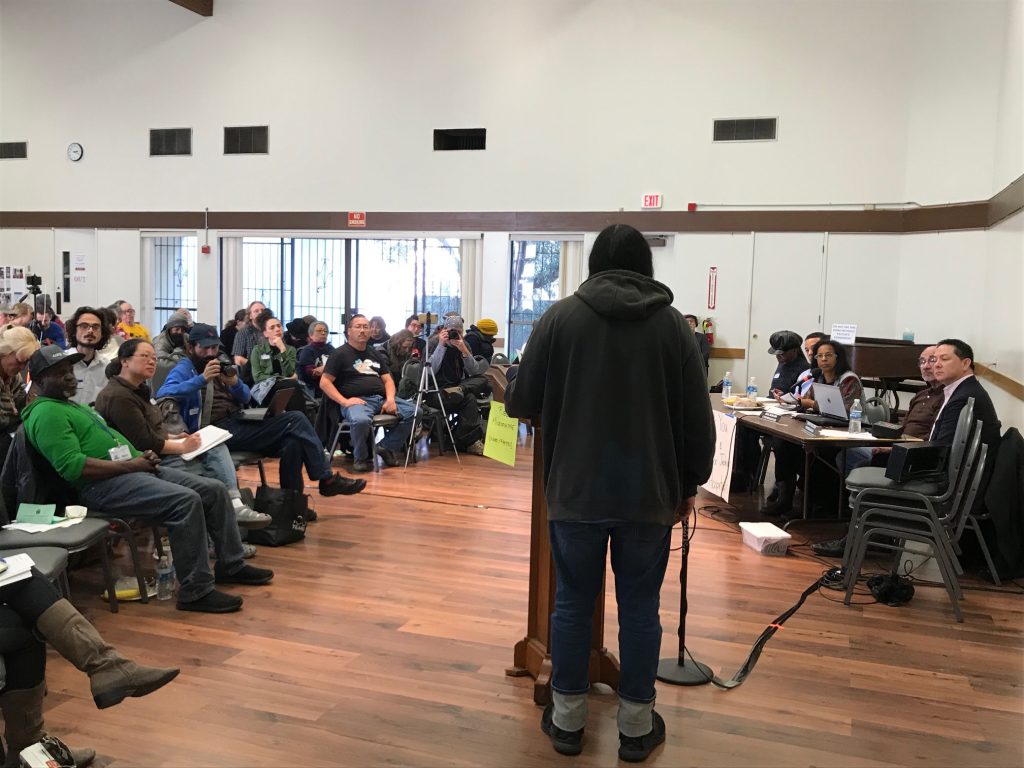
The Oakland Police Commission seeks answers from the community.
On Saturday, February 16 the Oakland Police Commission hosted its first community meeting, at the Taylor Memorial Church. The topic of the meeting was police interactions with homeless people.
About 60 people were present, many of them either currently or formerly unhoused. The meeting was an opportunity for unhoused community members to share stories about their interactions with the police, and make suggestions about how the department can improve. The testimonies recorded at the hearing will be the foundation for the commission to draft new policy that could protect unhoused folks from police misconduct.
“Sometimes they ask for ID, sit in front of you for days and observe. You got to move. It’s intimidating…a constant struggle between being secure and displaced in a minute,” a homeless man named Sean Williams told me at the event.
The Police Commission was created in 2016, when 83 percent of Oakland voters passed Measure LL to create a new independent police commission to oversee the Oakland Police Department. The commission is meant to interrogate OPD’s practices and policies to ensure they meet the constitutional standard of policing, and to oversee the Community Police Review Agency that investigates police misconduct and recommends discipline. When hiring a new chief of police, the mayor must choose one of four candidates elected by the Police Commission. The group also has the power to remove the chief of police for any reason.

In order to include unhoused voices, volunteers from the Coalition on Police Accountability drove around in vans and offered rides to people who wanted to testify. Some found out about the event through homeless shelters. Others found out about it through word of mouth.
The people who testified at the meeting addressed a wide range of topics. Mavin Carter-Griffin, co-founder of the Wood Street Collective—a homeless camp in West Oakland—raised the issue of police response time and intimidation tactics.
“You don’t want to deal with them and they don’t want to deal with you. We don’t need to be policed, we don’t need to be parented. We’re homeless people—we’re not even homeless, our home is Oakland. We’re just architecturally challenged.”
Derrick Soo echoed Griffin’s concerns about response time. A member of the 77th Avenue Rangers, a self-governing encampment in Oakland, Soo described a recent incident in which it took OPD 15 minutes to respond after somebody brandished a gun at his camp. Homeless advocate Mike Lee, who was also present at the gun incident, says that in the meantime “we are going to protect what we have… defend ourselves by any means necessary.”
‘When police approach people they should come looking to inform, not enforce.’
Other speakers called for clearer communication between OPD and the homeless community. KP, a formerly houseless youth in Oakland who is now in his first year at state college, shared a desire for open communication. “I personally believe that when police approach people they should come looking to inform, not enforce. They don’t have any access to resources or things to do correctly or where to go they just tell you what not to do and that’s not very helpful.”
Lorelei Lamberson, a member of the Homeless Advocacy Working Group, called for service providers to be present when encampments are closed, instead of police officers who exacerbate violence and use up resources that could be better allocated. She added that police are used as a tool to evict the people they view as inconvenient.
“I see that the police work with the business improvement district to use private security to harass homeless people. Because police are there [at evictions] it gives the [Department of Public Works] the feeling that they can do whatever they want and so they don’t follow their policy.”
There was also concern about the ways in which OPD treats unhoused individuals struggling with mental health issues. Formerly homeless Oakland resident Veronica Alexander said she believes people aren’t seeking services and would rather live in tents because they face discrimination from social services, police, mental health agencies, and the community.
Another formerly homeless Oakland resident named Victoria Bell has been arrested twice for misdemeanors which she says were based on false accusations. She says that her mental illness is held against her by police, despite her non-violent approach: “Just because I have mental illness, doesn’t mean I don’t know my rights.”
Like many, Bell shared that the police intimidate her. After calling OPD to arrest a visitor at her house, police took her keys away despite her disclosure that she takes medication every night. The police made her feel unsafe re-entering her unlocked house.
Emma Estrada is a writer who lives in Los Angeles and a UC Berkeley graduate.
